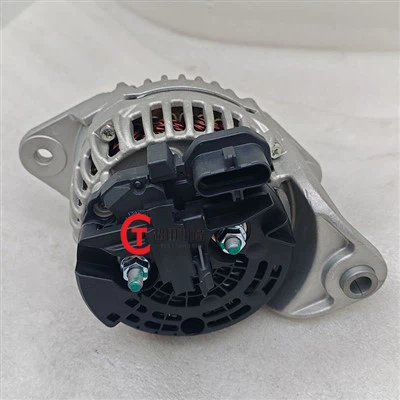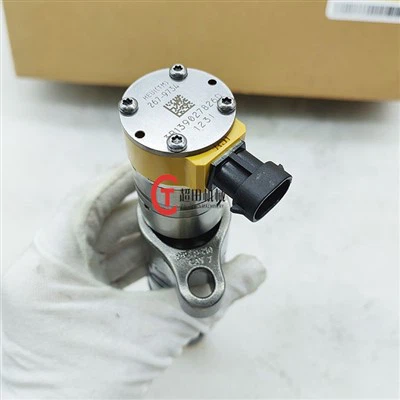As a fuel injector supplier deeply entrenched in the automotive and industrial engine sectors, I've witnessed firsthand the critical role fuel injectors play in engine performance and exhaust emissions. The question of whether a fuel injector can cause excessive exhaust emissions is not only relevant but crucial for engine owners, mechanics, and environmentalists alike. In this blog, I'll explore the science behind fuel injectors, how they can contribute to excessive emissions, and what solutions are available.


Understanding Fuel Injectors
Fuel injectors are precision-engineered components responsible for delivering the right amount of fuel into the engine's combustion chamber at the right time. They are the gatekeepers between the fuel supply and the engine, and their proper functioning is essential for efficient combustion. Modern fuel injectors are typically electronically controlled, allowing for precise metering of fuel based on various engine parameters such as engine speed, load, and temperature.
The process of fuel injection involves several steps. First, the fuel is pressurized by the fuel pump and delivered to the injectors. Then, the injector nozzle opens, allowing the fuel to spray into the combustion chamber in a fine mist. This mist mixes with the incoming air, creating a combustible mixture that is ignited by the spark plug (in gasoline engines) or by the heat of compression (in diesel engines). The efficiency of this process depends on the injector's ability to deliver the correct amount of fuel in the right spray pattern.
How Fuel Injectors Can Cause Excessive Exhaust Emissions
There are several ways in which a malfunctioning fuel injector can lead to excessive exhaust emissions.
1. Incomplete Combustion
One of the most common causes of excessive emissions is incomplete combustion. When a fuel injector fails to deliver the correct amount of fuel or sprays it in an uneven pattern, the fuel-air mixture may not burn completely. This results in the production of unburned hydrocarbons (HC), carbon monoxide (CO), and particulate matter (PM) in the exhaust. In gasoline engines, incomplete combustion can also lead to the formation of nitrogen oxides (NOx) due to the high temperatures generated by the unburned fuel.
For example, if an injector is clogged or has a faulty nozzle, it may not be able to atomize the fuel properly. This can cause large droplets of fuel to enter the combustion chamber, which are more difficult to burn completely. As a result, these unburned fuel droplets are expelled from the engine as HC and PM emissions.
2. Over - Fueling
Another way a fuel injector can cause excessive emissions is by over - fueling the engine. This can happen if the injector is stuck open or if the electronic control system malfunctions. When too much fuel is injected into the combustion chamber, there is not enough oxygen to burn it all, leading to the production of CO and HC emissions. Over - fueling can also increase the engine's fuel consumption, reducing its efficiency.
In diesel engines, over - fueling can cause the engine to produce excessive amounts of black smoke, which is mainly composed of PM. This not only contributes to air pollution but can also indicate a serious problem with the engine's fuel injection system.
3. Leaking Injectors
A leaking fuel injector can also be a source of excessive emissions. If fuel leaks from the injector into the intake manifold or the engine compartment, it can evaporate and enter the atmosphere as HC emissions. Leaking injectors can also cause the engine to run rough and may lead to other problems such as misfires and reduced power.
Signs of a Faulty Fuel Injector
It's important to recognize the signs of a faulty fuel injector so that it can be replaced or repaired before it causes excessive emissions and other engine problems. Some common signs of a faulty fuel injector include:
- Poor Engine Performance: A faulty injector can cause the engine to run rough, misfire, or hesitate during acceleration. This is because the engine is not receiving the correct amount of fuel or because the fuel is not being burned efficiently.
- Reduced Fuel Economy: If a fuel injector is over - fueling the engine or causing incomplete combustion, it can lead to a significant reduction in fuel economy. You may notice that you are filling up your gas tank more frequently than usual.
- Excessive Exhaust Smoke: As mentioned earlier, a faulty injector can cause the engine to produce excessive amounts of black, white, or blue smoke from the exhaust. Black smoke usually indicates over - fueling or incomplete combustion, while white smoke may be a sign of coolant leaking into the combustion chamber, and blue smoke can indicate oil burning.
- Check Engine Light: A malfunctioning fuel injector can trigger the check engine light on your dashboard. The onboard diagnostic system (OBD) in your vehicle can detect problems with the fuel injection system and store diagnostic trouble codes (DTCs) that can help a mechanic identify the source of the problem.
Solutions for Faulty Fuel Injectors
If you suspect that a fuel injector is causing excessive emissions or other engine problems, there are several solutions available.
1. Cleaning
In some cases, a clogged or dirty fuel injector can be cleaned to restore its proper function. There are several fuel injector cleaning products available on the market that can be added to the fuel tank to dissolve deposits and contaminants in the injector. However, this method may not be effective for severely clogged injectors or those with mechanical problems.
2. Replacement
If cleaning does not solve the problem, the faulty fuel injector will need to be replaced. When replacing a fuel injector, it's important to choose a high - quality replacement part that is compatible with your engine. As a fuel injector supplier, we offer a wide range of fuel injectors for different types of engines, including C9 Engine Fuel Injectors 267 - 9734 2679734, 235 - 2888 Fuel Injector C9 for E330D Excavator, and 211 - 3028 Fuel Injector for C15 C18 Diesel Engine. These injectors are designed to meet or exceed the original equipment manufacturer (OEM) specifications, ensuring reliable performance and low emissions.
3. Professional Diagnosis and Repair
If you are not sure whether a fuel injector is the cause of your engine problems, it's best to have your vehicle diagnosed by a professional mechanic. A mechanic can use specialized diagnostic tools to test the fuel injectors and determine if they are functioning properly. They can also perform other tests to check for other potential problems with the engine's fuel system, ignition system, or exhaust system.
Importance of Maintaining Fuel Injectors
Maintaining your fuel injectors is essential for reducing exhaust emissions and ensuring the long - term performance of your engine. Regular maintenance can help prevent problems such as clogging, over - fueling, and leaking injectors. Here are some tips for maintaining your fuel injectors:
- Use High - Quality Fuel: Using high - quality fuel can help prevent the formation of deposits in the fuel injectors. Low - quality fuel may contain impurities and additives that can clog the injectors over time.
- Change the Fuel Filter Regularly: The fuel filter is responsible for removing dirt, debris, and other contaminants from the fuel before it reaches the injectors. Changing the fuel filter at the recommended intervals can help prevent these contaminants from reaching the injectors and causing damage.
- Perform Regular Tune - Ups: Regular tune - ups can help ensure that the engine's fuel injection system is functioning properly. This includes checking the fuel injectors, spark plugs, ignition system, and other components for wear and tear.
Conclusion
In conclusion, a fuel injector can indeed cause excessive exhaust emissions if it is not functioning properly. Incomplete combustion, over - fueling, and leaking injectors are some of the ways a faulty injector can contribute to air pollution. Recognizing the signs of a faulty injector and taking appropriate action, such as cleaning or replacing the injector, can help reduce emissions and improve the engine's performance.
As a fuel injector supplier, we are committed to providing high - quality fuel injectors that meet the strictest environmental standards. If you are experiencing problems with your engine's fuel injection system or are looking to replace your fuel injectors, we invite you to contact us for more information and to discuss your specific needs. We can help you find the right fuel injector for your engine and ensure that it is installed correctly.
References
- Heywood, J. B. (1988). Internal Combustion Engine Fundamentals. McGraw - Hill.
- Bosch Automotive Handbook. (2007). Robert Bosch GmbH.
- Society of Automotive Engineers (SAE) technical papers on fuel injection systems.






